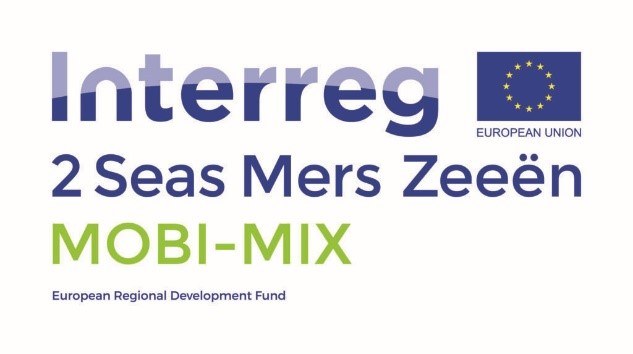Interreg 2 Seas - MOBI-MIX
Introduction
MOBI-MIX is focussed on the improved implementation of shared mobility and MaaS to increase up-take of low-carbon transport in cities. The project aids five different cities in pilot-projects related to MaaS and shared mobility.
The consortium includes five cities (Rotterdam, Antwerp, Norfolk, Mechelen, Valenciennes), two knowledge partners (Ghent University and Gustave Eiffel University) and (POLIS, CoMoUK, Transalley technology park and Cambridge Cleatech)
The project is set up to run for three years (March 2020 – September 2022) and is coordinated by BAXCO.
Project description
In MOBI-MIX, cities take a proactive role in working with the private sector to implement the second generation of Shared Mobility and MaaS pilots for a controlled sustainable modal shift. This is in response to the technology-led approach of the first generation and the resulting negative consequences and restrictive mitigation policies. Public authorities within MOBI-MIX will test different public-private collaboration models (e.g. outcome-oriented contracting models or new governance models) with private suppliers to implement shared mobility solutions and MaaS leading to a significant CO2 reduction. However, for large scale uptake, a structured collaboration framework needs to be defined and integrated in the urban- and mobility plans. This does not yet exist in the EU, positioning MOBI-MIX as a pioneer project, enabling a large scale uptake of shared mobility solutions beyond the MOBI-MIX partnership and project lifetime.
Objectives
The MOBI-MIX cities are working to decarbonise road transport (cars in particular). Within the project, they will facilitate the private sector to more effectively implement Shared Mobility solutions (e.g. e-bikes, e-scooters, shared mopeds, docked bikes, shared cars) and MaaS solutions (the integration of various forms of transport services into a single mobility service accessible on demand).
These are the objectives of MOBI-MIX:
- Reduction of 365.000 kg of CO2-emissions by avoiding/replacing 2.6M fossil-fueled car-kilometres in the urban environments of 5 cities/regions in the 2 Seas area over the course of the project
- Embed lessons learned and best practices in the urban mobility plans of the cites, serving 1.5M inhabitants, leading to a significant CO2 reduction beyond project lifetime
- Create a comprehensive decision-making framework for urban mobility planners of cities across Europe to facilitate the implementation of MaaS and Shared mobility more effectively.
Role of Ghent University
The Social and Economic Geography (SEG) Research group at the Department of Geography of Ghent University focuses on three research pillars:
- travel behaviour analysis and city logistics
- urban geography and world city formation
- territorial organisation and spatial planning
Within MOBI-MIX, the SEG research group will mainly focus on the making of 5 reports for the 5 public authorities showing the potential impact of different Shared Mobility- and MaaS solutions for their different geographical areas and target groups. Furthermore, it will provide multiple insight reports related to multiple modes cities are willing to implement (e.g. MaaS insight report and carsharing report). UGent will analyse as well when citizens opt for shared transport modes in urban MaaS contexts. What makes people switch from their private car to a shared option? How to make shared mobility solutions more attractive to end-users? The aim is to give cities an increased understanding of which mobility solutions are suitable for their local environment and behavioural needs.
Dutch summary
In MOBI-MIX spelen steden een proactieve rol in de samenwerking met de particuliere sector om de tweede generatie van gedeelde mobiliteit en MaaS-pilots voor een gecontroleerde duurzame modal shift te implementeren. Dit is een reactie op de technologie gestuurde aanpak van de eerste generatie en de daaruit voortvloeiende negatieve gevolgen en het restrictieve mitigatiebeleid. Overheidsinstanties binnen MOBI-MIX zullen verschillende publiek-private samenwerkingsmodellen (bijvoorbeeld resultaatgerichte contractmodellen of nieuwe bestuursmodellen) met particuliere leveranciers testen om gedeelde mobiliteitsoplossingen en MaaS te implementeren die leiden tot een aanzienlijke CO2-reductie. Voor grootschalige invoering moet echter een gestructureerd samenwerkingskader worden gedefinieerd en geïntegreerd in de stads- en mobiliteitsplannen. Dit bestaat nog niet in de EU en positioneert MOBI-MIX als een pioniersproject dat een grootschalige invoering van gedeelde mobiliteitsoplossingen mogelijk maakt die verder gaat dan het MOBI-MIX-partnerschap en de levensduur van het project.
French summary
Dans le cadre de MOBI-MIX, les villes jouent un rôle proactif en travaillant avec le secteur privé pour mettre en œuvre la deuxième génération de projets pilotes de mobilité partagée et de MaaS pour un transfert modal durable contrôlé. Cette démarche répond à l'approche technologique de la première génération et aux conséquences négatives et politiques d'atténuation restrictives qui en découlent. Les autorités publiques dans le cadre de MOBI-MIX testeront différents modèles de collaboration public-privé (par exemple, des modèles de contrats axés sur les résultats ou de nouveaux modèles de gouvernance) avec des fournisseurs privés pour mettre en œuvre des solutions de mobilité partagée et des MaaS conduisant à une réduction significative des émissions de CO2. Toutefois, pour une adoption à grande échelle, un cadre de collaboration structuré doit être défini et intégré dans les plans d'urbanisme et de mobilité. Ce cadre n'existe pas encore dans l'UE, ce qui fait de MOBI-MIX un projet pionnier, permettant une adoption à grande échelle de solutions de mobilité partagées au-delà du partenariat MOBI-MIX et de la durée de vie du projet.
Website
https://www.interreg2seas.eu/en/MOBI-MIX
Contact
Prof. dr. Frank Witlox
Department of Geography
Phone number: 09 264 45 53
E-mail
